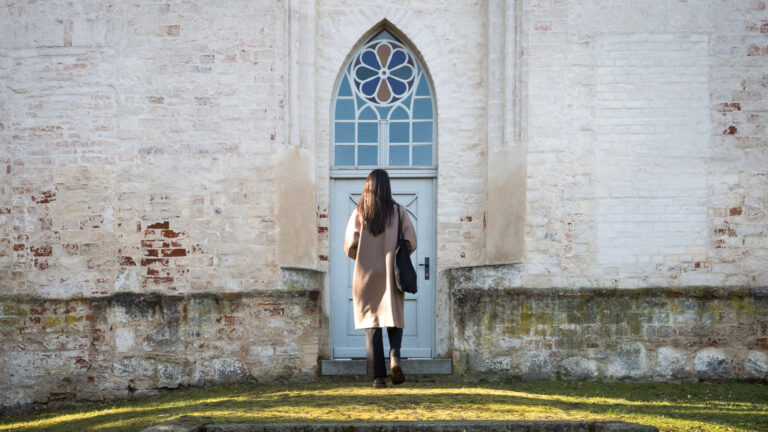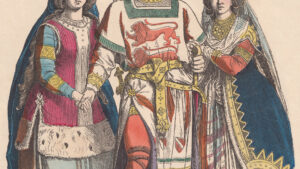On My Shelf helps you get to know various writers through a behind-the-scenes glimpse into their lives as readers.
I asked Thaddeus Williams—associate professor of systematic theology at Biola University and author of Confronting Injustice without Compromising Truth: 12 Questions Christians Should Ask About Social Justice—about what’s on his bedside table, favorite fiction, favorite rereads, and much more.
What’s on your nightstand right now?
My daily go-to lately has been Abraham Kuyper’s devotional Honey from the Rock. It’s a gem, especially for those who crave theologically rich devotional content. Kuyper reminds me daily how small I am and how big God is.
I’ve also been working through Tom Holland’s tome Dominion, which is illuminating about how the Christian vision of power as service and sacrifice has reshaped our world over the centuries.
Then there are books on my nightstand that I rotate through by the chapter, which currently includes William Wilberforce’s Real Christianity, Matthew Barrett’s None Greater, G. K. Chesterton’s In Defense of Sanity, Natasha Crain’s Faithfully Different, George Yancey’s One Faith No Longer, and Thomas Sowell’s Intellectuals and Race.
What are your favorite fiction books?
I’m a huge fan of C. S. Lewis’s underrated space trilogy, especially the finale That Hideous Strength, which I have reread more than any other work of fiction, always finding a treasure trove of new theological and cultural insights. My favorite fiction list also includes Lewis’s Great Divorce, especially the “red lizard” chapter, The Silver Chair, especially the “Queen of Underland” chapter, and Dostoyevsky’s Brothers Karamazov, especially “the Grand Inquisitor” chapter, which I think just may be the best chapter outside Scripture in the history of literature. Beyond that, given the reality of common grace, I find much truth in David Foster Wallace’s Infinite Jest as well as Jack Kerouac’s On the Road (especially his great line, “The ones who never yawn or say a commonplace thing, but burn, burn, burn, like fabulous yellow roman candles exploding like spiders across the stars and in the middle you see the blue centerlight pop and everybody goes ‘Awww!’”). Sir Arthur Conan Doyle’s Sherlock Holmes stories are always a delight.
What biographies or autobiographies have most influenced you and why?
Confessions by Augustine and The Life and Narrative of Frederick Douglass top my list of autobiographies. As far as biographies, John Piper’s two books, The Legacy of Sovereign Joy: God’s Triumphant Grace in the Lives of Augustine, Luther, and Calvin and The Hidden Smile of God: The Fruit of Affliction in the Lives of John Bunyan, William Cowper, and David Brainerd, are immensely helpful. I return again and again to anything Charles Spurgeon wrote about his personal experience of anxiety and depression, especially “The Minister’s Fainting Fits.”
What are some books you regularly reread and why?
My regular rereads include C. S. Lewis’s That Hideous Strength, J. I. Packer’s Knowing God, Abraham Kuyper’s Lectures on Calvinism, Alexander Solzhenitsyn’s World Split Apart, H. R. Rookmaaker’s Modern Art and the Death of Culture (which has a brilliant riposte, Modern Art and the Life of Culture by William Dyrness and Jonathan Anderson).
What books have most profoundly shaped how you serve and lead others for the sake of the gospel?
From the time I first read Francis Schaeffer’s The God Who Is There on a trans-Pacific flight to Nepal in 1998, I have never been the same. Schaeffer’s willingness to think deeply about literature, art, philosophy, politics, science, film, and anything and everything else under the sun, and under the lordship of Christ, made an indelible mark in how I communicate gospel truth. Schaffer’s student Jerram Barrs wrote Learning Evangelism from Jesus, which has also had a major influence, as has J. I. Packer’s classic Evangelism and the Sovereignty of God.
The book on discipleship I have given out more than any other—the book that I have seen God use more than any other in my students lives to shatter pornography addictions and other besetting sins—is John Owen’s classic The Mortification of Sin.
What’s one book you wish every pastor read?
Knowing God by J. I. Packer and, when you’ve finished, Knowing God again and again. Throw in Herman Bavinck’s The Wonderful Works of God and Stephen Charnock’s The Existence and Attributes of God for good measure. The more often we remind ourselves of the size and splendor of the God we’re serving, the less seriously we take ourselves. And not taking ourselves seriously is an essential mark of good pastors.
If your congregation wants to think biblically through the social justice controversies of our age, which is likely, I recommend Carl Trueman’s The Rise and Triumph of the Modern Self and George Yancey’s Beyond Racial Gridlock. My publisher would be happy if I throw a nod to Confronting Injustice without Compromising Truth: 12 Questions Christians Should ask about Social Justice.
What are you learning about life and following Jesus?
I’ve been learning that a mark of a reverent life, esteeming God more and more as he deserves, has a beautiful side effect. It means that we don’t have to take ourselves all that seriously!
Value God’s reputation foremost and it becomes that much easier to tolerate a stranger’s online cheap shot or even a verbal knife in the back from someone we trusted. Care about his glory and fame, his cosmic-redemptive platform, and our own platforms and popularity begin to seem as cutesy and small as they truly are. I’m learning that we were designed to run on awe. We think, relate, function, and thrive better when we’re transfixed by something or Someone truly awesome, and it’s good news that God is infinitely more interesting and awe-inspiring than we are. For every thought or worry we have about ourselves, may we think a hundred thoughts about God, his glory, and his goodness. Holy Spirit, make it so in our hearts and minds.






































